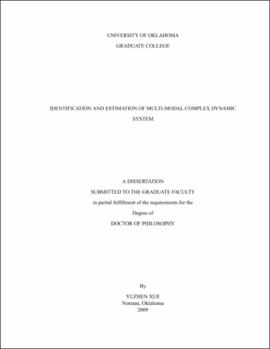| dc.description.abstract | In this dissertation we study identification of complex dynamic systems as well as hybrid system estimation. For the identification part, we propose a scheme to identify an autonomous complex stochastic dynamic system based on a black-box model, that is, the system is modeled based on output data only. The system under study is a system whose underlying space is the union of strong attraction domains. The system exhibits a behavior such that it spends a long time in one strong attraction domain before transitioning to another one. Systems showing this behavior can be found in many applications ranging from biology to power systems to chemical processes. Considering the nature of this type of a system, we model it as a hybrid system. In particular, it is a strong attraction domain featured hybrid system (SAFHS). Two principal features of this type of a hybrid system are that the boundaries between the modes (strong attraction domains) are nonlinear and the dynamic behavior within each mode can be highly nonlinear, e.g. limit cycle. Identification algorithms for this kind of hybrid system are not well developed. In this dissertation we propose our first result for identification of this type of system. The resulting model is hybrid in nature. We detect the multi-modal dynamics as well as local dynamics within each mode, thus providing a complete unified approach of identification of the system dynamics. The approach developed in this dissertation is based on finite dimensional approximations of compact operators, spectral theory for non-reversible Markov chains, identification techniques for hidden Markov models (HMM), and identification techniques for linear and non-linear dynamics. Examples are carried out to verify our analysis and to illustrate the effectiveness of the proposed algorithms. In the estimation part, we present a high accuracy, low computational load method for a nonlinear/non-Gaussian hybrid system, motivated by the need to get a better trade-off between efficiency and accuracy which is a crucial issue in real time estimation problems. The efficiency and accuracy of the proposed algorithm are illustrated by examples. Moreover, its good performance makes it practical and robust for tracking a target in a complex situation, as we demonstrate by a simulated maneuvering target tracking example. | |
